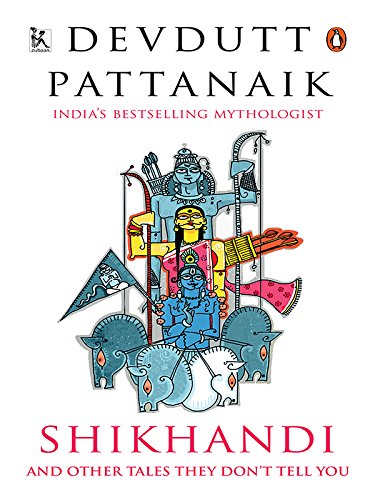Book Review of Krishna's Secret by Devdutt Pattanaik
Krishna’s Secret by Devdutt Pattanaik is actually extracted from 7 Secrets of Vishnu by the same author. The primary sources of life story of Krishna are the epics Bhagavata and Mahabharata. The former refers to his childhood whereas the latter mostly deal with his adulthood. These two when combined – says the author – create the purna-avatar, the most wholesome manifestation of God. There are various illustrations of Krishna and author’s interpretations are written on them. First of all, we have to remember that Krishna's Secret is no history book. There are no secrets revealed, and it tells you nothing that you don't know already. It is the gist of all the references that are available in our scriptures and epics, plus Devdutt Pattanaik's own explanations.
Krishna's Secret begins with Devdutt Pattanaik explaining the meaning of the word ‘Krishna’. Also how
Krishna, as a Hindu God is different from other Hindu Gods is clarified. According
to Hindu mythology, an ancestor of Krishna named Yayati was cursed for his
lewdness to become old and impotent. During that time, there must have been a system
of transferring such burdens to someone else - a tradition still followed in
some of our Government offices. Yayati begs his sons to suffer the curse on his
behalf. Yadu the eldest son saw through his father’s schemes and bluntly
refused. The youngest son Puru, however agrees. This gives promiscuous Yayati immeasurable
joy. He blesses Puru heartily. Yayati declares Puru his heir and continues with
his wantonness. Krishna was a descendant of Yadu. Though kingship was right
under his nose, it was fairly unachievable. The throne passes on to Puru’s
descendants, the Pandavas and Kauravas.
The author reproduces the origin and life story of Krishna
that we’ve probably read in thousand places, with thousands of different
interpretations and told and retold to us by the grandmas and grandpas a
zillion times. But none of those stories came with the disclaimer – Mythologies
are not to be taken literally. Neither does this book. According to the author
every miraculous incident is symbolic. Even Krishna’s multiplying himself to make
love with all his wives at the same time is symbolic and not improbable. With
this clever mechanism the book steers clear of controversies.
When Pandavas, having lost at gambling, were sent to exile
for thirteen years, Krishna asked them to leave. They had given words, he says,
so they have to keep it. The same Krishna thinks Bhishma was punishable as the
latter stayed loyal to his words all his life. When Draupadi was being disrobed
before the elders, nobody came to save their daughter-in-law and Krishna aptly
disapproves of it. But when Karna decided to keep his word of honor and joined
Duryadhona in battle, Krishna concluded, he deserved punishment. All these
contradictions were addressed and justified in this book.
Krishna knew it beforehand that Ashwatthama would attack the
Pandava’s camp at night and would kill all the five children of Draupadi. Krishna
knew it BECAUSE HE WAS A GOD, yet he did nothing to prevent it, because he
wanted to Pandavas to learn that there’s a consequence of every war. Since
Krishna himself motivated them to fight this war, the conclusion is somewhat
like this: God punishes us for following God’s instructions of punishing those
who don’t follow God’s instructions.
In the final chapter of the Mahabharata, Yudhishtira finds
the Kauravas – that is the dead Kauravas – in heaven. He naturally freaks out
and asks,
‘How can they – the cause of so much suffering – be given a place in heaven?’
To which Krishna rebukes him and says,
‘You killed them in battle and ruled their lands and still you hate them? You claim to have renounced the world but you have not renounced your rage. How then can you stake a claim to heaven?’
That is the typical case of a teacher who, in her
embarrassment of not knowing the answer of a certain question, retorts and
admonishes the pupil for making a nuisance of himself. However, I am sure the
ardent believers of mythologies will come up with a thousand or more
justifications for Yudhishtira’s question and also an explanation for Krishna
evasiveness.
It becomes evident that Devdutt
Pattanaik had done a thorough research on this. He had minutely observed
all the traditions and rituals to their cores. In the subject of mythology his
knowledge is encyclopedic. The compactness of Krishna’s Secret is notable. But that is just one of his fortes. Nothing
– not even a single word – mentioned in this book is irrelevant. Also it is
written in a style that makes it feel like one’s reading one of those
fascinating book of fiction. All the painstaking research work is cloaked in
his remarkable style of story-telling.
 |
 |
 |


No comments:
Post a Comment